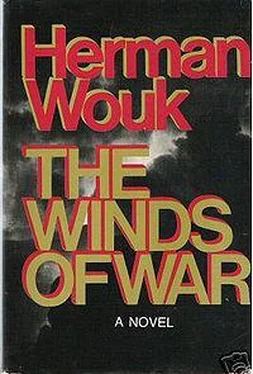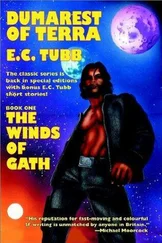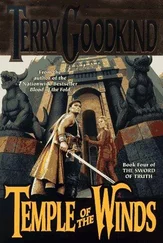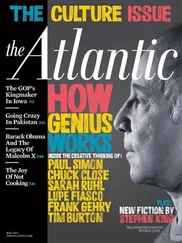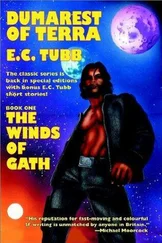Herman Wouk - The Winds of War
Здесь есть возможность читать онлайн «Herman Wouk - The Winds of War» весь текст электронной книги совершенно бесплатно (целиком полную версию без сокращений). В некоторых случаях можно слушать аудио, скачать через торрент в формате fb2 и присутствует краткое содержание. Год выпуска: 1971, Издательство: Collins, Жанр: Историческая проза, на английском языке. Описание произведения, (предисловие) а так же отзывы посетителей доступны на портале библиотеки ЛибКат.
- Название:The Winds of War
- Автор:
- Издательство:Collins
- Жанр:
- Год:1971
- ISBN:нет данных
- Рейтинг книги:4 / 5. Голосов: 1
-
Избранное:Добавить в избранное
- Отзывы:
-
Ваша оценка:
- 80
- 1
- 2
- 3
- 4
- 5
The Winds of War: краткое содержание, описание и аннотация
Предлагаем к чтению аннотацию, описание, краткое содержание или предисловие (зависит от того, что написал сам автор книги «The Winds of War»). Если вы не нашли необходимую информацию о книге — напишите в комментариях, мы постараемся отыскать её.
About the Author
Herman Wouk's acclaimed novels include the Pulitzer-Prize winning
;
;
;
;
;
; and
.
The Winds of War — читать онлайн бесплатно полную книгу (весь текст) целиком
Ниже представлен текст книги, разбитый по страницам. Система сохранения места последней прочитанной страницы, позволяет с удобством читать онлайн бесплатно книгу «The Winds of War», без необходимости каждый раз заново искать на чём Вы остановились. Поставьте закладку, и сможете в любой момент перейти на страницу, на которой закончили чтение.
Интервал:
Закладка:
But he became bored with such tinkering. He did too poorly in mathematics to think of engineering.
He might have been an athlete. He was agile, and sturdier than he looked, but he disliked the regimens and teamwork of school athletics, and he loved cigarettes and beer, though the gallons of beer he drank did not add a millimeter to his waistline. At Columbia College (where he was admitted because he charmed an interviewer, scored well on the intelligence test, and wasn’t a New Yorker) he barely avoided expulsion for bad grades. What he enjoyed was taking his ease at his fraternity house, or playing cards and pool, or reading old novels over and over, or talking about girls and fooling with them. He did find in fencing a sport suited to his independent temper and his wiry body. Had he trained more he might have been an intercollegiate finalist at the épée. But it was a bore to train, and it interfered with his idleness.
In his junior year he elected a course in fine arts, which athletes took because, so the report ran, nobody ever failed it. However, at mid-semester, Byron Henry managed to fail. He had done no work and cut half the classes. Still, the F startled him. He went to see the professor and told him so. The professor, a mild bald little lover of the Italian Renaissance, with green spectacles and hairy ears, took a liking to him. A couple of remarks Byron made on Leonardo and Botticelli showed that, in the few sessions he had attended, he had learned something, unlike the rest of the hulking somnolent class. They became friends. It was the first intellectual friendship in Byron Henry’s life. He became an enthusiast for the Renaissance, slavishly echoing the professor’s ideas, and he finished college in ablaze of B pluses, cured of beer guzzling and afire to teach fine arts. One year of graduate work at the University of Florence for a Master of Arts degree; that had been the plan.
But a few months in Florence cooled Byron. One rainy November night, in his squalid rented room overlooking the muddy Arno, sick of the smells of garlic and bad plumbing, and of living alone among foreigners, he wrote his friend that Italian painting was garish, saccharine, and boring with its everlasting madonnas, babes, saints, halos, crucifixions, resurrections, green dead Saviors, flying bearded Jehovahs, and the rest; that he much preferred moderns like Miró and Klee; and that anyway, painting was just interior decoration, which didn’t really interest him. He scrawled several pages in this cornered-rat vein, mailed them off, and then went vagabonding around Europe, forsaking his classes and his hope of a graduate degree.
When he got back to Florence, he found a cheering letter from the professor.
…I don’t know what will become of you. Obviously art was a false lead. I think it did you good to get hot on some subject. If you can only shake off your lethargy and find something that truly engages you, you may yet go far. I am an old traffic cop, and standing here on my corner I have seen many Chevrolets and Fords go by. It’s not hard for me to recognize the occasional Cadillac. Only this one seems badly stalled.
I’ve written about you to Dr. Aaron Jastrow, who lives outside Siena. You know of him. He wrote A Jew’s Jesus , made a pot of money, and got off the miserable academic treadmill. We used to be friends at Yale, and he was very good indeed at bringing out the best in young men. Go and talk to him, and give him my regards.
That was how Byron happened to call on Dr. Jastrow. He took a bus to Siena, a three-hour run up a rutted scary mountain road. Twice before he had visited the bizarre little town, all red towers and battlements and narrow crooked streets, set around a gaudy zebra-striped cathedral, on a hilltop amid rolling green and brown Tuscan vineyards. Its main claim to fame, aside from the quasi-Byzantine church art he had studied there, was a peculiar annual horse race called the Palio, which he had heard about but never seen.
At first glance, the girl at the wheel of the old blue convertible made no strong impression on him: an oval face, dark enough so that he first took her for an Italian, dark hair, enormous sunglasses, a pink sweater over an open white shirt. Beside her sat a blond man covering a yawn with a long white hand.
“Hi! Byron Henry?”
“Yes.”
“Hop in the back. I’m Natalie Jastrow. This is Leslie Slote. He works in our embassy in Paris, and he’s visiting my uncle.”
Byron did not much impress the girl either. What Natalie Jastrow saw through the dark glasses was a slender lounger, obviously American, with red glints in his heavy brown hair; he was propped against the wall of the Hotel Continental in the sun, smoking a cigarette, his legs loosely crossed. The light gray jacket, dark slacks, and maroon tie were faintly dandyish. The forehead under the hair was wide, the long slanting jaws narrow, the face pallid. He looked like what he was — a collegiate drone, a rather handsome one. Natalie had brushed these off by the dozen in earlier years.
As they wound through narrow canyons of crooked ancient red-brown houses and drove out into the countryside, Byron idly asked Slote about his embassy work. The Foreign Service man told him he was posted in the political section and was studying Russian and Polish, hoping for an assignment to Moscow or Warsaw. Sitting in the car, Slote appeared very tall; later Byron saw that he himself was taller than Slote; the Foreign Service officer had a long trunk but medium-size legs. Slote’s thick blond hair grew to a peak over a high forehead and narrow pinkish face; the light blue eyes behind rimless glasses were alert and penetrating, and his thin lips were compressed as though with habitual resolve. All the time they drove, he held a large black pipe in his hand or in his mouth, not smoking it. It occurred to Byron that the Foreign Service might be a pleasant career, offering travel, adventure, and encounters with important people. But when Slote mentioned that he was a Rhodes Scholar, Byron decided not to pursue the topic.
Jastrow lived in a yellow stucco villa on a steep hillside, with a fine view of the cathedral and Siena’s red towers and tile roofs. It was a drive of about twenty minutes from town. Byron hurried after the girl and Slote through a terraced flowering garden full of black-stained plaster statues.
“Well, there you are!” The voice was high, authoritative, and impatient, with a faint foreign note in the pronouncing of the r ’s.
Two sights struck Byron as they entered a long beamed living room: a painting of a red-robed Saint Francis with arms outstretched, on a background of gold, taking up a good part of one wall, and far down the long sitting room on a red silk couch, a bearded little man in a light gray suit, who looked at his watch, stood, and came toward them coughing.
“This is Byron Henry, Aaron,” the girl said.
Jastrow took Byron’s hand in two dry little paws and peered up at him with prominent wavering eyes. Jastrow’s head was large, his shoulders slight; he had aging freckled skin, light straight hair, and a heavy nose reddened by a cold. The neatly trimmed beard was all gray. “Columbia ’38, is it?”
“Yes, sir.”
“Well, well, come along.” He went off down the room, buttoning the flapping folds of his double-breasted suit. “Come here, Byron.” Plucking the stopper out of a heavy crystal decanter, he carefully poured amber wine into four glasses. “Come Leslie, Natalie. We don’t take wine during the day, Byron, but this is an occasion.” He held up his glass. “To Mr. Byron Henry, eminent hater of the Italian Renaissance.”
Byron laughed. “Is that what Dr. Milano wrote? I’ll drink to that.”
Jastrow took one sip, put down his glass, and looked at his watch. Seeing the professor wanted to get at his lunch, Byron tossed off the sherry like a shot of rye. Jastrow exclaimed with a delighted smile, “Ah! One, two, three. Good lad. Come along, Natalie. Leslie, take your glass to the table.”
Читать дальшеИнтервал:
Закладка:
Похожие книги на «The Winds of War»
Представляем Вашему вниманию похожие книги на «The Winds of War» списком для выбора. Мы отобрали схожую по названию и смыслу литературу в надежде предоставить читателям больше вариантов отыскать новые, интересные, ещё непрочитанные произведения.
Обсуждение, отзывы о книге «The Winds of War» и просто собственные мнения читателей. Оставьте ваши комментарии, напишите, что Вы думаете о произведении, его смысле или главных героях. Укажите что конкретно понравилось, а что нет, и почему Вы так считаете.
